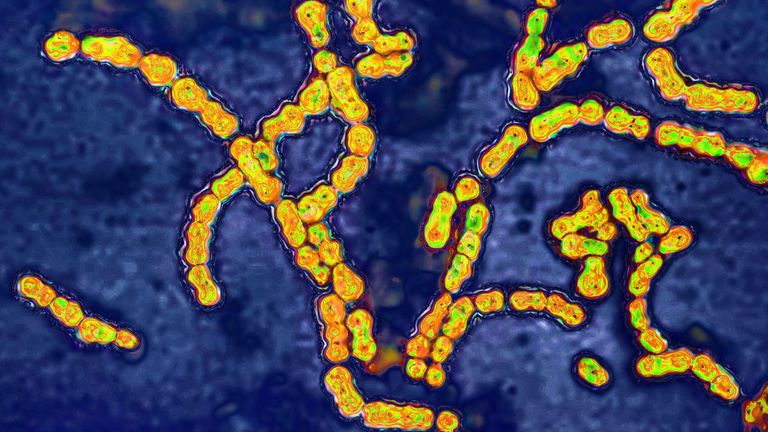Strep A: Two more penicillin medicines added to list of alternatives – as scarlet fever cases ‘three times higher than normal’ | UK News
Pharmacists can supply two more alternative penicillin medicines to help ensure there’s enough of the drug to treat Strep A cases.
It comes as cases of scarlet fever, which is caused by Strep A bacteria, are three times the normal rate – causing temporary shortages at some chemists.
SSP (serious shortage protocols) now cover a total of five medicines, adding to the three issued earlier this week, with a tablet now on the Department of Health list.
It means pharmacists can supply an alternative form of penicillin without the patient having to go back to a GP if the prescribed one is out of stock.
SSPs are a standard procedure to manage temporary supply issues, say health chiefs.
At least 19 children across the UK have now died from invasive Strep A (also known as iGAS), a more serious form of the infection which enters parts of the body such as the lungs and bloodstream.
However, the vast majority of cases can be easily treated and are relatively mild, with commons symptoms including a sore throat, rash and fever.
Professor Susan Hopkins, chief medical adviser at the UK Health Security Agency (UKHSA), said it had been notified of just over 7,500 scarlet fever cases – but that the figure was “probably an underestimate”.
“We have a lot of reports coming in in the last few days so we expect it to be even higher,” she told the BBC’s Today programme on Saturday.
“That’s about three times higher than the same time in a normal season,” she said.
Read more:
What is Strep A and what are the symptoms of the bacterial infection?
Strep A is common and generally causes mild infections – so why the spate of deaths now?
“The last bad season we had in 2017 and 18. And in invasive Group A Strep cases, we are more than halfway through what we’d normally see in an average season.
“We’ve seen 111 cases in children aged one to four and 74 cases in children aged five to nine.”
Official UKHSA figures for England and Wales show that it was notified of 1,702 cases of scarlet fever in the week ending 11 December, with 1,352 in the week before that, 1,044 in the week before that and 960 cases in the week ending 20 November – a near doubling of the cases in a month.
The latest weekly figure for iGAS cases was 15, up from 10 the week before.
Prof Hopkins stressed that most children have a mild illness and said she had an “open mind” as to why infections were so high.
Some other experts have suggested it could be because there is less immunity because of reduced mixing during COVID lockdowns.
Parents are being urged to get their children vaccinated with the flu nasal spray because areas that are already rolling it out have a lower rate of Strep A cases.
Professor Hopkins said people with flu infections are more likely to get a secondary infection on top, with children who get flu often at higher risk of contracting Strep A.
Children younger than school age can get the vaccine from their GP, while children in school can get it via the school vaccination service.
The SSP penicillin list now includes:
- Phenoxymethylpenicillin 125mg/5ml oral solution
- Phenoxymethylpenicillin 125mg/5ml oral solution sugar free
- Phenoxymethylpenicillin 250mg/5ml oral solution
- Phenoxymethylpenicillin 250mg/5ml oral solution sugar free
- Phenoxymethylpenicillin 250mg tablets
